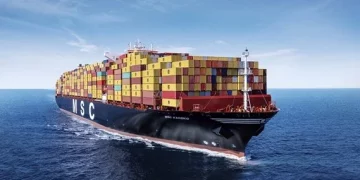Amidst the ongoing security threats from missiles and drones in the Red Sea and the Gulf of Aden, US policymakers are actively assessing the potential economic fallout and devising strategies to manage disruptions. In a recent session titled “Menace on the Red Sea: Securing Shipping Against Threats in the Red Sea,” held by the US House of Representatives, Subcommittee on Coast Guard and Maritime Transportation, insights were provided by Bud Darr, responsible for “Maritime Policy and Governmental Affairs” at MSC.
The initial focus of attacks on vessels with Israeli connections has escalated into indiscriminate threats, placing all commercial vessels transiting the Southern Red Sea and Gulf of Aden in a precarious position. In response, MSC has strategically rerouted services around the Cape of Good Hope until confidence in the Red Sea’s security is restored, necessitating a comprehensive revamp of its global network.
Addressing the economic ramifications stemming from these altered shipping patterns, Darr highlighted the potential impacts on the broader supply chain. Congressman Dan Webster, Chairperson of the Subcommittee, drew parallels with lessons learned from past crises, including disruptions in 2021 and issues at the Panama Canal, underscoring the need for proactive measures.
Darr emphasized MSC’s commitment to serving international trade, ensuring adaptability and resilience in global maritime commerce despite geopolitical challenges. With the world’s largest fleet, comprising over 800 container ships and a capacity exceeding 4 million TEU, MSC aims for uninterrupted access to US ports, safeguarding the global market reach for importers and exporters.
Crucially, Darr distinguished the current logistical challenges from the 2021 situation, emphasizing the unique nature of the present issues. The strategic redirection of shipping routes raises concerns about supply chain efficiency and the potential for extended transit times, impacting not only MSC but also the broader logistics ecosystem. This situation underscores the critical importance of improving shoreside components, including infrastructure and operational practices, to fortify logistics against future crises and minimize disruptions in the intricate global supply chain.





















